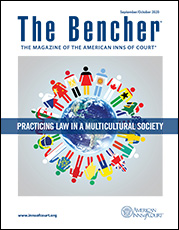The Virtual Courtroom—Zoom on Steroids
The Bencher—September/October 2020
By Richard K. Herrmann, Esquire

 During the past several months we have been exposed to a number of different approaches to practicing law remotely. One of these has been video conferencing through a variety of platforms that work well generally but present questions of insecurity, awkwardness, and general lack of formality. Services have been available to assist courts with remote technology, but the coronavirus pandemic has brought them front and center. One service is CourtScribes led by Michael Breyer.* I thought it might be helpful to talk with him here:
During the past several months we have been exposed to a number of different approaches to practicing law remotely. One of these has been video conferencing through a variety of platforms that work well generally but present questions of insecurity, awkwardness, and general lack of formality. Services have been available to assist courts with remote technology, but the coronavirus pandemic has brought them front and center. One service is CourtScribes led by Michael Breyer.* I thought it might be helpful to talk with him here:
Herrmann: I know you are not a member of the Delaware Bar, but where have we seen you in the past?
Breyer: In 2001, I worked with courts to install public Wi-Fi networks in courthouses across the country, and the Delaware courts were one of the first courts to allow us to install such networks. We then expanded from basic network services to media coverage of court proceedings and broadcast trials.
Herrmann: Tell us about CourtScribes.
Breyer: CourtScribes provides judges with a turnkey virtual courtroom with 24/7 operator-assisted support. We layer great customer service, scheduling, technical support, trained operators, and enhanced features like exhibit sharing and closed captioning on top of an easy-to-use platform to provide a virtual courtroom that assists judges in moving along demanding court calendars. Our staff acts as a virtual judicial assistant who helps the judge through the sharing of exhibits, breakout rooms, etc. We have also supported the Center for Legal and Court Technology project at William & Mary Law School.
Herrmann: How does CourtScribes control security?
Breyer: Our operators monitor for internet hackers interrupting court proceedings. Only authenticated participants are allowed into the virtual courtroom, and judges are given the option to password-protect entrance. One way of balancing the public’s right to view or listen to court proceedings with the court’s desire to ensure the proceedings are secure and uninterrupted is to provide separate access to the public through either a live stream or provide the public with a “view/listen only” link or phone number to access the hearings. Sensitive documents or sidebar conversations would be protected and screened from public access.
Herrmann: Walk us through a virtual hearing.
Breyer: Our operator will greet all attorneys in a virtual lobby in advance of the hearing, ensuring that attorneys connecting to the call are muted until their case is called. The CourtScribes operator can troubleshoot attorney connections, volume controls, and linking a user’s telephone to their video if applicable. The CourtScribes operator will announce that the judge has arrived and that court is now in session. The operator will have the attorneys available for the judge whenever the judge is ready for a particular case to be called, instruct the attorney to announce his/herself each time the attorney addresses the court, monitor and provide technical assistance during the hearing, mute attorneys as necessary, serve as a virtual judicial assistant to the judge (assisting with screen sharing, private discussions in breakout rooms, etc.), and provide access to late arriving attorneys in the virtual lobby, ensuring there is no disruption to the actual hearing.
Herrmann: How have court reporters reacted to this kind of service?
Breyer: We have a very positive relationship with official court reporters because they understand that we are here to assist the court and in no way intend to replace the very valuable work that they do. While we can create high-quality transcripts of the proceedings like we do when we provide court reporting services in depositions outside of the courtroom environment, we do so only in jurisdictions and proceedings where the official court reporter is not available. Recordings of court proceedings are only made with a judge’s approval.
Herrmann: What is the cost to use CourtScribes?
Breyer: There is no cost to the court. The attorneys in Delaware pay a minimal charge of $15 per connection during the COVID-19 crisis to help us cover our costs. After COVID-19, we will charge $30 per connection.
Herrmann: If anyone is interested in seeing a live session in action, is there a way to do this?
Breyer. Yes, please visit www.courtscribes.com and contact us by phone or email.
*Disclaimer: CourtScribes is one of many technology services available to courts and attorneys. This interview is intended for informational purposes only and neither Richard K. Herrmann, Esq., or the American Inns of Court has received any form of compensation for publishing this information.
Richard K. Herrmann, Esquire, is director of law and technology and visiting professor at Delaware Law School. He is a Master of the Bench member of the Richard K. Herrmann Technology AIC.